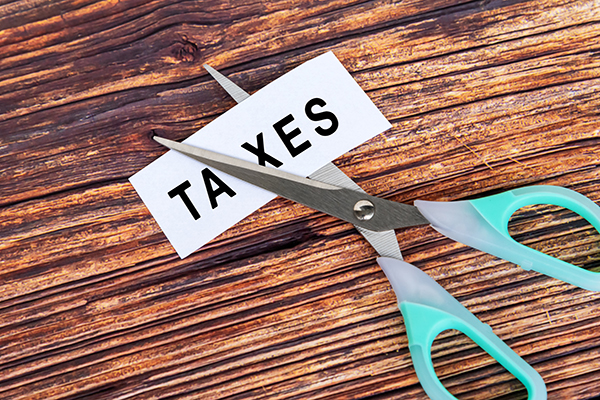17 ways to cut your tax bill
Saving tax is one the simplest ways to put more money in your pocket. Rachel Lacey shares tips on how to protect your finances from HMRC.
26th November 2024 09:00

The UK’s tax burden is currently at a 70-year high and it’s only going to get higher. According to forecasts from the Office for Budget Responsibility (OBR), by 2028-29, 38.2p in every pound the economy makes will be spent on tax.
Chances are you don’t need to be told you’re paying a lot of tax and, after recent announcements in the Budget, you may well be worried about the amount you’ll be paying in the future too.
- Invest with ii: Open a Low Cost SIPP | What is a SIPP | Interactive investor Offers
But, as infuriating as it might be, there are plenty of ways to cut your personal bill. Get started with our tips.
Income tax
1) Check your tax code
Nearly a third (31%) of people who check their tax code discover that they have been on the wrong one at some point, with three-quarters of those overpaying by an average of £689, according to Canada Life. Check your code and find out what it means.
2) Shelter your cash from tax
Increases to interest rates mean more people are breaching the personal savings allowance. A basic-rate taxpayer now only needs to have around £20,000 in a top easy-access account before they will have to pay tax on savings interest, while a higher-rate taxpayer needs just £10,000. Use cash ISAs if you haven’t already used your £20,000 annual allowance to shelter your savings from tax.
3) Make sure you’re getting the correct rate of pensions tax relief
If you pay higher or additional rate tax, you may need to complete a tax return to get the correct rate of tax relief on your pension contributions. Pensions you arrange yourself such as self-invested personal pensions (SIPPs), and some workplace schemes, will only apply basic-rate tax relief automatically. If you pay into a work pension and aren’t sure whether you get the correct rate, check with HR. If it’s a ‘relief at source’ scheme, rather than ‘net pay’ you’ll need to complete a tax return.
- Is it time to come out of cash? And what to buy now
- 10 hottest ISA shares, funds and trusts: week ended 22 November 2024
4) Give to charity
Charity donations also benefit from tax relief. Gift Aid allows the charity to boost your donation by 20% (turning £1 to £1.25) but if you are a higher or additional rate taxpayer you can claim a further 20% or 25% yourself through your tax return. It’s up to you whether you give the money to charity or use it to reduce your own tax bill.
5) Boost your partner’s pension
If you’re married or live with your partner, you can pay less tax between you in retirement if you have two pensions to draw from. That’s because you’ll be able to use each of your tax allowances. If your partner’s pension is lacking you can pay into a pot on their behalf. If they don’t work, the amount you can pay in is capped at £2,880, but will be boosted to £3,600 once basic-rate tax relief has been applied.
Inheritance tax
6) Be generous next time you’re invited to a wedding
If you have a child getting married (or entering a civil partnership) you can give them up to £5,000 free of IHT. You can also give grandchildren (or great grandchildren) £2,500 or £1,000 to anyone else who’s tying the knot.
7) Use your annual gift allowance
You might know that you can give away £3,000 to whoever you like tax free each year. But did you know you can carry forward last year’s allowance if you didn’t use it? That means a married couple gifting for the first time can giveaway £12,000 in one go.
8) Make regular gifts from income
We hear lots about gifting allowances, but you can actually give away as much money as you like tax free, so long as you can demonstrate that the money is from income and doesn’t affect your standard of living, using the regular gifts from surplus income rule. Stuck for ideas? Talk to your kids – chipping in for grandchildren’s music classes or tutors in the run-up to exams could make a big difference to the family finances and give you a warm glow.
- What the Budget means for inheritance tax planning
- How IHT on pensions could impact your retirement choices
9) Plan ahead
You can give away lump sums beyond the permitted allowances – but you’ll need to survive seven years for your gifts to become totally tax free. That means if you want to give away a significant lump sum, you need to plan ahead and not leave it to the last minute.
10) Enjoy your wealth
Giving money away in your lifetime isn’t the only way to cut an IHT bill. You can also spend your money and enjoy your wealth yourself. Whether it’s a fancy holiday, a weekly cleaner or help with the garden, spending is the most straightforward way of getting money out of your estate.
11) Write a will
If you have a sizeable estate, you may be able to reduce your IHT bill with a well-written will. You can also reduce the rate of IHT from 40% to 36% if you leave 10% of the taxable value of your estate to charity.

Capital gains tax
12) Invest in ISAs
You can invest up to £20,000 a year in a stocks and shares individual savings account (ISA). This will shelter your gains from capital gains tax (CGT) and there won’t be any tax on dividends either.
13) Get money out of general investment accounts
If you hold any investments in trading accounts they could be subject to CGT when you come to sell them. You may also be paying tax on dividends. However, if you have any ISA allowance remaining, you can sell them and immediately rebuy them in an ISA using ‘Bed & ISA’ rules. This will shelter them from tax going forward.
You just need to be mindful that you don’t move so much in one go that you trigger a CGT bill on the sale.
14) Report your losses
If you suffer any investment losses you might not want to tell your friends or family, but you should inform HMRC within four years. This is because you can use these losses to offset capital gains and potentially reduce a future CGT bill.
15) Give money to your spouse
Giving your spouse an asset – or splitting it with them – can be a great way of reducing CGT. Transfers between spouses are tax free and mean you both get to use your annual CGT allowance (currently £3,000 a year). If you can’t avoid paying CGT altogether, there may still be benefits of transferring assets, if they pay a lower rate of tax than you. Just be aware that the gift needs to be outright – you won’t be able to claim it back at a later date.
16) Use your annual allowance
Your annual CGT allowance will only apply in the year you sell gains, so it makes sense to use it every year. Although the 30-day rule means you can’t rebuy the same investment to realise a gain, you can reinvest gains in a similar or equivalent investment and reduce your future CGT bill. Alternatively, you could use it as an excuse to do a bit of spring cleaning on your portfolio. By ‘top slicing’ gains on your most profitable investments and reinvesting in other assets you can rebalance your portfolio to restore your target asset allocation.
17) Finally…understand when you need professional help
There are numerous ways to reduce a tax bill, but it can be complicated, especially when it comes to CGT and IHT where there is a lot of money at stake. But professional advice from a regulated financial planner can help you structure your finances in a way that is as tax-effective as possible.
These articles are provided for information purposes only. Occasionally, an opinion about whether to buy or sell a specific investment may be provided by third parties. The content is not intended to be a personal recommendation to buy or sell any financial instrument or product, or to adopt any investment strategy as it is not provided based on an assessment of your investing knowledge and experience, your financial situation or your investment objectives. The value of your investments, and the income derived from them, may go down as well as up. You may not get back all the money that you invest. The investments referred to in this article may not be suitable for all investors, and if in doubt, an investor should seek advice from a qualified investment adviser.
Full performance can be found on the company or index summary page on the interactive investor website. Simply click on the company's or index name highlighted in the article.
Please remember, investment value can go up or down and you could get back less than you invest. If you’re in any doubt about the suitability of a stocks & shares ISA, you should seek independent financial advice. The tax treatment of this product depends on your individual circumstances and may change in future. If you are uncertain about the tax treatment of the product you should contact HMRC or seek independent tax advice.
Important information – SIPPs are aimed at people happy to make their own investment decisions. Investment value can go up or down and you could get back less than you invest. You can normally only access the money from age 55 (57 from 2028). We recommend seeking advice from a suitably qualified financial adviser before making any decisions. Pension and tax rules depend on your circumstances and may change in future.
Editor's Picks